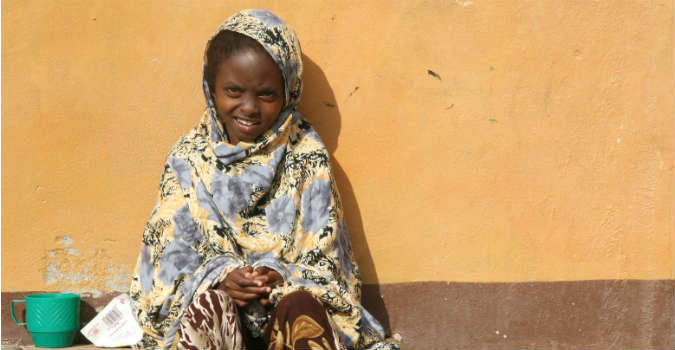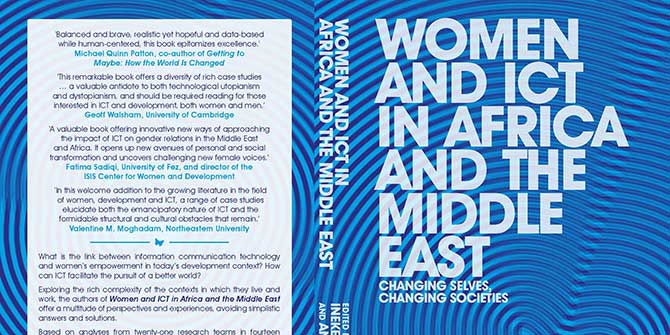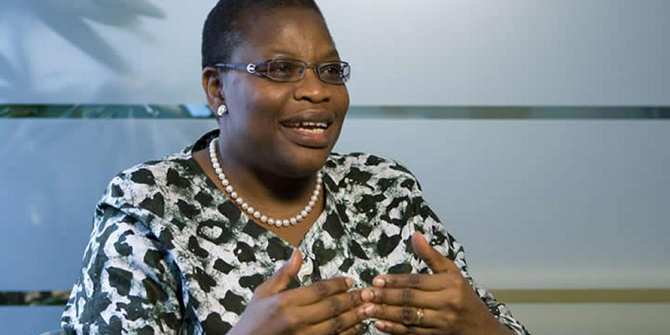LSE’s Jescinta Izevbigie examines the obstacles faced by African women in entering the public life.
The under-representation of women in public life is not just an African problem, it is also a global issue. If greater numbers of women are to take up roles in spheres such as politics, it is vital that lessons are learned from those have already achieved a measure of success. One such person is Dr Joyce Banda, Malawi’s first female President and Africa’s second, who recently delivered a lecture at LSE.
The reality today is that women still face considerable challenges in their journey to public life. Speaking recently at LSE, President Banda listed some of the constraints facing women. These include limited access to formal education, lack of economic empowerment, and patriarchal societies. One of the most important constraints, I believe, comes from women themselves. Apart from the gendered socialisation process, dominant negative attitudes and hierarchal traditional institutions, women also play a role in perpetuating and creating obstacles for other women.
Any comprehensive approach tackling the challenges women face in the public sphere must factor in obstacles not only imposed on women, but also those created by women. During my internship with the Rwandan Women Parliamentary Forum in Kigali, I interacted with female parliamentarians and female civil society leaders and I observed that there was a discrepancy between parliamentarians’ impression of their role and the community’s impression of parliamentarians’ role. Civil society leaders viewed women in parliament as out of touch with their communities. Female parliamentarians resented this criticism and accused civil society leaders of being unaware of the hard work involved in not only achieving their position, but retaining it. While these opinions hardly represent the broad spectrum of women in parliament and civil society, it does raise a critical point as to the cleavages that often exist within and across groups.
Many fail to realise that the inclusion of men is imperative when constructing women’s empowerment and gender equity initiatives. While reflecting on the international community’s engagement with women and development initiatives from the World Conferences on Women in the 1990s down to today, President Banda repeatedly stressed this has been lacking. Involving men would have been invaluable in not only closing the gender gap, but also creating more sustainable initiatives. She remarked that “while women are the majority (over 52%), the last time I checked we brought the other half into the world.” Many mistakenly view gender inequality as “women’s issues,” but the fact is that women cannot get anywhere if the insights and concerns of men are not included in the conversation. President Banda went on to stress that, “It’s what we do as mothers. Women are always the first to say to boys, ‘don’t try to act like a girl.’ Telling boys not to get into the kitchen and cook, it is us mothers who are at the centre as perpetrators.” By framing men as the sole “oppressor” we are not only restricting their ability to enter the conversation, but also shifting the focus away from “inter-gender cleavages.” As an African woman, I have personally felt gender stereotypes perpetuated more by my female relatives than the males. When analysing this issue, it is really interesting to see how this narrative of oppression for women is framed and the particular stories that are often left out. This perpetuation of gender stereotypes by women against women is an important story that cannot be forgotten and must be central to any sustainable initiative.
Divisions among women could also be a contributing factor towards the lack of role models and mentorship opportunities for women by women. President Banda noted that the fact that all her mentors had been men illustrates this issue. She remarked, “So much of what it takes to be a leader has been historically defined by men, while I wanted to be a leader, the last thing I wanted to do was become a man to be taken seriously. I was not capable of being anyone other than who I am.” Women sometimes feel obliged to “masculinise” their traits to gain political ground. This not only expands the divide among women, but perpetuates the gender norms against which women seek to fight.
A heated exchange between Nairobi Governor, Evans Kidero and Nairobi Women Representative, Rachel Shebesh in Kenya in 2013 highlights another hurdle facing women. Confrontation between the two politicians stemmed from accusations that Governor Kidero was withholding paychecks from county employees on strike in Nairobi. Recorded by NTV Kenya, video footage shows Rachel Shebesh confronting Kidero outside his office and Kidero slapping her in the face. Despite the shocking nature of this act, various news outlets chose to defend Governor Kidero while slandering Shebesh, accusing her of having an extramarital affair and questioning her character as a woman. Journalist Patrick Wachira of The People newspaper wrote, “She comes across as rather too brazen, too strident, too loud and too aggressive to resonate well with common standards of modesty expected of a woman.” He continued, “If Shebesh had acted differently, maybe, just maybe, she would have been treated differently. You want to be treated as a woman? Then make matters simple: act like a woman should.” Looking at this incident, it is clear that the treatment of women in public life receive does not encourage others to follow suit. It also sends a message to the world that women have no place or voice publicly. These gender norms that pervade not only the private sphere, but also the public ones, are restricting women’s ability to redefine their role in society. The most effective way of combating this and better navigating these normative structures is to ensure that all parties, both women and men, are involved in promoting greater equality.
Looking at Africa’s political landscape, President Banda is right to say that the participation of women in leadership must be a common agenda for both men and women. Women need to be conscious of the role they play in perpetuating the stereotypes that inadvertently act as a form of oppression for others of their gender. Additionally, any sustainable gains will not be possible if women cannot unite under a common goal. It is also worth noting that some men, due to exclusion, conceptualise gender equity campaigns as the empowerment of women at the cost of their disempowerment. To dismantle this belief, campaigns need to realise the complementary roles of men and women in gender equality. While the grain of leadership withers away too early for women, as remarked by President Banda, I still believe that through joint effort and mutual support a new seed of equality can become implanted in society. Leymah Gbowee, renowned Liberian peace activist once said, “you can tell people of the need to struggle, but when the powerless start to see that they really can make a difference, nothing can quench the fire.”







2 Comments